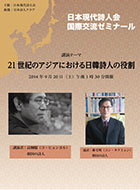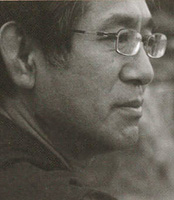国際交流
韓国から二氏招き国際交流ゼミナール
21世紀のアジアにおける日韓詩人の役割
9月20日(土)午後1時30分から東京・早稲田奉仕園リバティホールで、国際交流ゼミナール「21世紀のアジアにおける日韓詩人の役割」が開催された。本年度は韓国から高炯烈氏と権宅明氏の二氏を招き、講演と座談会を行った。
高氏は1954年韓国江原道束草市生まれの詩人で、荘子や仏教などを学び思索的な詩を発表し、多くの詩集を刊行してきた。また「創作と批評社」の優れた編集者でもあった。朝鮮人被爆者を取材し日米韓の歴史を踏まえて人類的な視点で書き上げた『長詩 リトルボーイ』を発表。その後も、アジア全体を視野に入れた詩誌「詩評」を創刊し、その誌上で多くの日本の詩人を韓国に紹介するなど、日本との関わりが深い詩人である。
権氏は1950年韓国慶州市生まれの詩人で、韓国外換銀行東京支店に駐在員として勤務する中で、三十年間に渡り日韓詩人の作品の翻訳を行っている。また、日韓交流の際の通訳を数多く務めてきた詩人でもある。
【第1部ゼミナール】
国際交流担当の鈴木比佐雄理事の司会で始まり、主催者を代表して日本現代詩人会会長財部鳥子が開会挨拶を述べ、本日の後援者である日本詩人クラブ会長細野豊氏からの来賓挨拶があった。次いで、「21世紀のアジアにおける日韓詩人の役割―アジア詩壇のアポリアを越えて」というテーマで高炯烈氏の講演が行われた。同時通訳は権宅明氏が担当された。
(高氏の講演)詩的想像力に豊んだ高炯烈氏の講演
「血を混ぜるとき、結婚する両者は民族と国家を超越する。」韓国の襄陽にある内水面研究所で取材した際、鮭の雌の卵と雄の白子を混ぜ合わせる場面に出会ったが、それは、今思い起こすと他の世界への移転の光景だった。
魯迅を深く研究した日本の批評家に竹内好がいる。彼によると、魯迅は暗黒期に闇(絶望)を見た。そして、魯迅はこの闇が虚像であることを発見し、また新しい一歩を踏み出したということを言っている。こうした一つの文章に触れることで、物の見方や考え方が全く変わるのを感じた。柄谷行人という批評家は、小説中心の近代文学は終わったと語っている。これは、近代文学が長い終焉の時代に入ったという意味だろう。私たちが向かっている近代文学の終焉に対して、新しい認識を持たなくてはならない。
東アジアの詩人の現状は、様々な困難な問題を抱えている。アジアでの日韓の詩人の役割を探すことは難題である。しかし、すべての国々が経験している文学の苦闘は、みな違うものがないことに同意する。
詩の創作は、その有無の対象たちを、再び翻訳して回心することでもある。他国の詩を言語で読み、翻訳を通して部分的な疎通が可能ではあるけれど、その解釈の結果は、甚だ不完全である。詩の誕生過程とその形式自体とその解釈自体が、すでに不完全なものであるしかない。近代の核心媒介である翻訳は、決して完全なものではない。
アジアの詩人たちは何が知りたく、何を疎通して互いに伝えたいのか、なぜ会わなければならないのか。この欠乏と渇望がなければ、「アジアの詩人」というものは存在する必要がない。
最近、韓国で『思想の原点』という重要な研究書が出版された。日本の竹内好は魯迅を研究した。中国の孫歌は竹内好を研究した。この三人を一緒に研究したのが著者である韓国の尹汝一氏である。これは今までになかった交差批評の方式を取った国際批評である。連動し、激動する東北アジアにおいて、こうした三国批評が存在することに大きな意味を置きたい。東北アジアには、私たちが一緒に渡って会わなければならない、未来の橋がある。
詩人たちにはアジア的視角が求められている。日韓両国の詩人たちには、三か国を自国のように同時に考え眺める方法と領域が必要である。
詩の形象化と翻訳は詩の夢であり壁でもある。その夢と壁を混ぜて、アジアが私の体に意識されることを願う。この囲まれた意識が、実はアジアのアポリアであるだろう。三国の詩が、アジア的な関係を持つことを望む。相手を徹底的に認めなければならないこの国際交流は、国内の詩壇と同じほど重要であると思う。各々の国内詩壇の国際性の強化は、国内詩壇を遥かに活性化させるだろう。アポリアは越えるために存在するものである。にもかかわらず、東北アジアは一つの地域に囲まれたまま、詩人の夢と想像を越えられないでいる。
すべての詩は抒情詩に回帰する。私はこの言葉をこのように言い換えたい。すべての人間と文明は抒情(詩)に回帰する。
*
高氏の講演は、アジアという広い視野に立ち詩的想像力に富んだ内容であった。また、権氏の同時通訳は絶妙なものだった。
(座談会)両国の詩をめぐる思い、各パネラーが語る
講演に引き続いて、「日韓現代詩の歴史と未来」というテーマで座談会が行われた。司会は韓国詩人の翻訳等で活躍している佐川亜紀氏。パネラーは高炯烈、柴田三吉、南邦和、権宅明(通訳兼任)の各氏。
冒頭に司会の佐川氏から、ご自身の詩と韓国詩の長年の紹介による功績が評価され、韓国の昌原KC国際詩文学賞の第5回受賞者となったことについて話があった。
座談会では、各パネラーが自らの韓国と関わりや両国の詩をめぐる思いが語られた。
「銀行員として日本に来てから、日本の現代詩に関心を持ち、韓国に紹介している。詩の翻訳は難しいが、漢字文化においては、漢字により他と比べて原詩に近い翻訳ができると思う。もっと作品の交流が必要だ。」(権氏)
「日中韓という視点やすべての詩は抒情詩に回帰するという高氏の話に心を惹かれた。韓国の抒情は日本とは違って内にこもったものだと考える。」(南氏)
「韓国に渡るのに、船で玄界灘を越えていったことが大きな実感として残っている。詩は象徴性が高いので翻訳は難しいが、逆に詩でしか伝わらないものがある。アジアへの想像力を培い共通する抒情に感応することが求められている。」(柴田氏)
「玄界灘の船上で、詩の朗読をするという夢を実現したい。アジアには人的のみならず作品の交流が大切だ。日韓の詩人会が協力して、その年に発表された優れた作品を選んで両国で出版してはみてはどうか。」(高氏)
こうした発言が印象的だった。
座談会に続いて、在日韓国青年同盟サウムルロリチームによる「韓国民族音楽演奏」が行われた。民族楽器の鉦や太鼓が鳴り響く溌剌とした演奏だった。
「朗読とスピーチ」のコーナーでは、中原道夫,中村純、上野都、なべくらますみの四人の詩人が登場し、各人が韓国との関わりなどを述べた後、自作の朗読を行った。
最後に日本現代詩人会理事長の北畑光男が閉会の辞を述べ、ゼミナールは無事終了した。
【第2部・懇親会】
懇親会は午後5時30分から、早稲田奉仕園ユーアイホールに会場を移して開かれた。司会は長津功三良、なべくらますみの二人が担当。金井雄二(日本現代詩人会副理事長)、清水茂(早稲田大学名誉教授)両氏の挨拶の後、参加者各氏のスピーチなどがあり和やかな雰囲気の中で交流が行われ、日本現代詩人会理事・新延拳氏の閉会挨拶を持って会を閉じた。 (記録・松本高直)
















